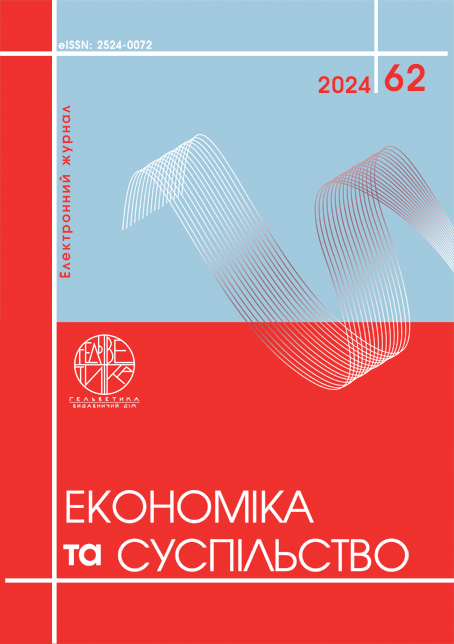IMPACT OF CORRUPTION ON THE ECONOMIC SECURITY OF THE STATE: ANALYSIS OF MECHANISMS AND CONSEQUENCES
Abstract
This article explores the role of corruption in the context of a state's economic security, highlighting its impact on public order, economic growth, and social justice. A detailed analysis of corruption mechanisms and their effects on economic resilience is provided, elucidating the multifaceted consequences of corrupt actions for the stability and development of the state. Special attention is given to the influence of corruption on public finances, where it undermines budget revenues and expenditures, negatively affecting the country’s economic stability. The article also examines the impact of corruption on foreign investments, which are crucial for economic development, as corruption presents a significant barrier to attracting capital. Furthermore, it is shown how corruption increases poverty levels through inefficient resource allocation and the exacerbation of social inequality. The necessity for political reforms and strategic actions aimed at reducing the influence of corruption and ensuring the state’s economic stability and security is discussed. The importance of international cooperation and the exchange of experiences in the fight against corruption is emphasized. The article delves into how corruption disrupts economic processes, leading to a misallocation of resources that can stifle economic growth and innovation. Corruption erodes public trust in institutions, creating an environment where unlawful activities can thrive, further destabilizing the economy. Moreover, the article highlights the interplay between corruption and foreign direct investment (FDI). By creating a hostile investment climate, corruption deters potential investors, leading to a reduction in the inflow of much-needed capital. This, in turn, hampers the country’s ability to develop its infrastructure and industrial base, which are essential for sustainable economic growth. The negative effects of corruption on FDI are illustrated with case studies from various countries, providing a comprehensive understanding of the issue. The discussion on poverty and social inequality provides an in-depth look at how corruption disproportionately affects the most vulnerable segments of society. By diverting public funds away from essential services and into the hands of a few, corruption exacerbates existing social disparities and hinders efforts to achieve social justice. The article proposes several anti-corruption measures, including enhancing transparency, strengthening legal frameworks, and promoting civic engagement, as ways to mitigate these adverse effects. Finally, the article underscores the critical role of international collaboration in combating corruption. By sharing best practices, adopting international standards, and supporting cross-border initiatives, countries can collectively enhance their efforts to tackle corruption. The article concludes by stressing the importance of sustained commitment to reform and the need for a holistic approach that includes governmental, societal, and international dimensions to effectively address the challenges posed by corruption and secure economic stability and security for the state.
References
Гулак О. В., Курило В. І., Дубчак Л. М. До питання про шляхи подолання корупції в Україні. Право та державне управління. 2021. № 1. С. 196–201. DOI: https://doi.org/10.32840/pdu.2021.1.29
«МінФін». Інформаційний ресурс. URL: https://index.minfin.com.ua/ua/economy/fdi/ (дата звернення: 22.05.2024).
Індекс сприйняття корупції – 2023. Transparency International Україна. Офіційний сайт URL: https://cpi.ti-ukraine.org/#/ (дата звернення: 22.05.2024).
Корчинський І. О., Мельник С. І. Основні загрози економічній безпеці держави в сучасних умовах роз¬витку. Ефективна економіка. 2019. № 10. URL: http://www.economy.nayka.com.ua/?op=1&z=7369 (дата звер¬нення: 21.05.2024). DOI: https://doi.org/10.32702/2307-2105-2019.10.79
Мандзіновська Х. О. Економічна безпека держави: сутність, складові елементи та проблеми забезпе¬чення. Економічні науки. Наукові записки. 2016. № 2 (53). С. 159–166. DOI: https://doi.org/10.32702/2307-2105- 2019.10.79
Офіційний сайт Європейської бізнес асоціації. URL: https://eba.com.ua (дата звернення: 22.05.2024).
Офіційний сайт Світового банку. URL: https://www.worldbank.org/ (дата звернення: 22.05.2024).
Саврасов М. Вплив корупції на економічне зростання в новому конструкті тінізації світової еконо¬міки. Економіка та суспільство.2023. № 53. DOI: https://doi.org/10.32782/2524-0072/2023-53-65
Самодай В., Ковтун Г. Корупція: загрози та наслідки для соціуму. Економіка та суспільство. 2023. № 49. DOI: https://doi.org/10.32782/2524-0072/2023-49-67
Славкова А., Колісник Д. Інвестиційна привабливість україни: реалії в умовах війни та перспек- тиви повоєнної відбудови. Економіка та суспільство. 2023. № 56. DOI: https://doi.org/10.32782/2524-0072/2 023-56-138
Пискун Л.М. Теоретико-методологічні основи дослідження тіньової економіки та корупції. Економіка та держава. 2021. № 4. С. 143–149. DOI: https://doi.org/ 10.32702/2306-6806.2021.4.143
Gulak О. V., Kurylo V. І., Dubchak L. М. (2021) Do pytannya pro shliahy podolannya koruptsii v Ukraini [To the question of ways to overcome corruption in Ukraine]. Pravo ta derzhavne upravlinnya. № 1, pp. 196–201. DOI: https://doi.org/10.32840/pdu.2021.1.29
"MinFin" Information resource. URL: https://index.minfin.com.ua/ua/economy/fdi/ (accessed May 22, 2024). (in Ukrainian)
Corruption perception index – 2023. Transparency International Ukraine. Official website URL: https://cpi.ti-ukraine.org/#/ (accessed May 22, 2024).
Korchynskyi І. О., Melnyk S. І. (2019) Osnovni zagrozy ekonomichniy bezpetsi derzhavy v suchasnyh umovah rozvytku [The main threats to the economic security of the state in modern conditions of development]. Efectyvna ekonomika, № 10. URL: http://www.economy.nayka.com.ua/?op=1&z=7369 (reference date: 21.05.2024). DOI: https://doi.org/10.32702/2307-2105-2019.10.79 (in Ukrainian)
Mandzihovska H. О. (2016) Ekonomichna bezpeka derzhavy: sutnist, skladovi element ta problem zabez¬pechennya [Economic security of the state: essence, constituent elements and problems of provision]. Ekono¬michni nauky. Naukovi zapysky, no. 2 (53), pp. 159–166. DOI: https://doi.org/10.32702/2307-2105-2019.10.79 (in Ukrainian)
European Business Association. Official website. URL: https://eba.com.ua (accessed May 22, 2024).
World Bank. Official website. URL: https://www.worldbank.org/ (accessed May 22, 2024).
Savrasov, М. (2023). Vplyv korruptsii na ekonomichne zrostannya v novomu konstrukti tinizatsii svitovoi ekonomiky [The influence of corruption on economic growth in the new construct of shadowing of the world economy]. Ekonomika ta suspilstvo, no. 53. DOI: https://doi.org/10.32782/2524-0072/2023-53-65 (in Ukrainian)
Samodai, V., Kovtun, G. (2023). Koruptsia: zagrozy ta naslidky dlya sotsiumu [Corruption: threats and con¬sequences for society]. Ekonomika ta suspilstvo, no. 49. DOI: https://doi.org/10.32782/2524-0072/2023-49-67 (in Ukrainian)
Slavkova, А., Kolisnyk, D. (2023). Investytsiina pryvablyvist ukrainy: realii v umovah viyny ta perspek-tyvy povoennoi vidbudovy [Ukraine's investment attractiveness: realities in war conditions and prospects for post-war reconstruction]. Ekonomika ta suspilstvo, no. 56. DOI: https://doi.org/10.32782/2524-0072/2023-56-138 (in Ukrainian)
Pyskun L. М. (2021) Teoretyko-metodolohichni osnovy doslidzhenya tinovoi ekonomiky ta koruptsii [Theoretical and methodological foundations of the study of the shadow economy and corruption]. Ekonomika ta derzhava, no. 4, pp. 143–149. DOI: https://doi.org/ 10.32702/2306-6806.2021.4.143 (in Ukrainian)


